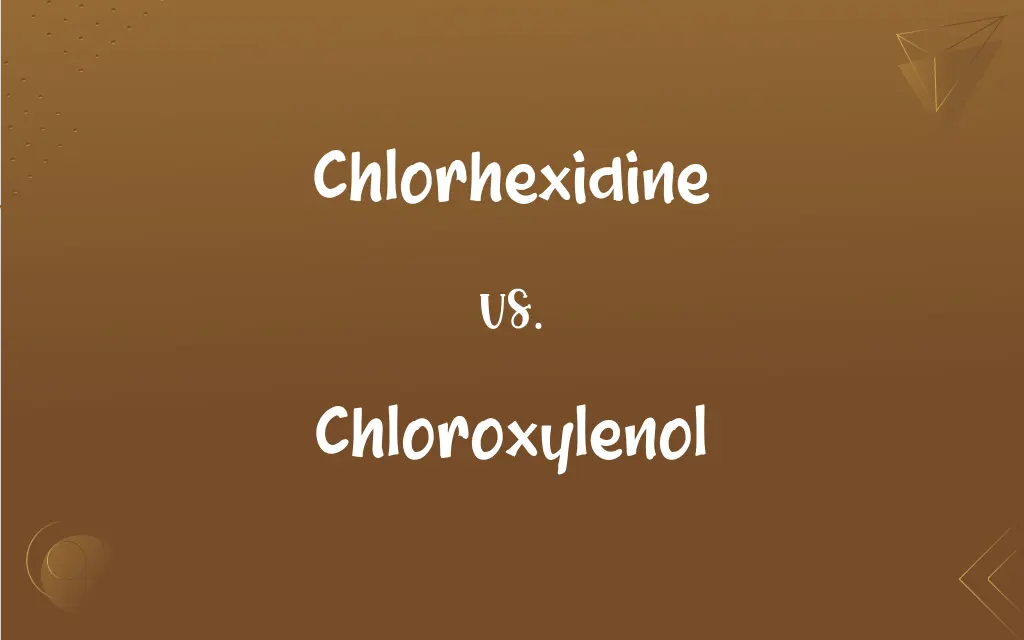Chlorhexidine vs. Chloroxylenol: What's the Difference?
Edited by Aimie Carlson || By Harlon Moss || Published on December 31, 2023
Chlorhexidine is an antiseptic effective against a wide range of bacteria, while chloroxylenol is a disinfectant used in skin and wound cleansers.

Key Differences
Chlorhexidine is a broad-spectrum antiseptic commonly used in healthcare for disinfecting skin and surgical instruments. Chloroxylenol, also an antiseptic, is used in various disinfectants and cleaners, particularly for skin and wound care.
Chlorhexidine is known for its effectiveness against a wide range of bacteria and some viruses and fungi. In contrast, chloroxylenol is less potent but still effective against bacteria and is used in household cleaning products.
Chlorhexidine can be used in preoperative skin preparations and mouthwashes, while chloroxylenol is often found in antiseptic soaps and household disinfectants.
Chlorhexidine is valued for its ability to adhere to skin and mucous membranes, providing lasting antimicrobial activity. Chloroxylenol, on the other hand, is less adherent but is considered gentler and is used in products like hand soaps.
The usage of chlorhexidine is generally in medical settings due to its strong antiseptic properties. Chloroxylenol, being milder, is more commonly used in household products for everyday cleaning and hygiene.
ADVERTISEMENT
Comparison Chart
Primary Use
Healthcare antiseptic for skin and instruments
Disinfectant in skin cleansers and household cleaners
Spectrum of Effectiveness
Broad-spectrum against bacteria, viruses, fungi
Effective against bacteria, used in household products
Common Applications
Preoperative skin preparations, mouthwashes
Antiseptic soaps, household disinfectants
Adherence and Duration
High adherence, long-lasting activity
Less adherent, used for gentle cleansing
Typical Setting of Use
Medical settings
Household and general hygiene settings
ADVERTISEMENT
Chlorhexidine and Chloroxylenol Definitions
Chlorhexidine
A chemical compound effective against a wide range of bacteria and some viruses.
Chlorhexidine is preferred in hospitals for its broad-spectrum antimicrobial properties.
Chloroxylenol
An antiseptic ingredient in household cleaners, known for its bactericidal properties.
Chloroxylenol in the cleaner helps eliminate bacteria from surfaces.
Chlorhexidine
A topical antiseptic for cleaning wounds and preventing infections.
Chlorhexidine was applied to the wound to prevent infection.
Chloroxylenol
A component in hand soaps and disinfectants for gentle cleansing.
Chloroxylenol-based hand soaps are popular in households.
Chlorhexidine
A healthcare antiseptic providing lasting protection against microbes.
Chlorhexidine is valued for its long-lasting effect on surgical sites.
Chloroxylenol
A milder antiseptic compared to other agents, suitable for regular use.
Chloroxylenol is a good choice for regular disinfection needs.
Chlorhexidine
An antiseptic agent used for skin disinfection and sterilizing surgical instruments.
Chlorhexidine was used to disinfect the surgical area before the procedure.
Chloroxylenol
A disinfectant used in skin cleansers and household cleaning products.
The soap containing chloroxylenol is effective for daily hygiene.
Chlorhexidine
A disinfectant commonly used in mouthwashes and dental treatments.
The dentist recommended a chlorhexidine-based mouthwash for gum disease.
Chloroxylenol
A chemical used in wound care products for its mild antiseptic qualities.
The wound was cleaned with a chloroxylenol solution.
Chlorhexidine
(pharmacology) A particular chemical antiseptic and bacteriostatic.
Chloroxylenol
(chemistry) A compound with the chemical formula C8H9ClO, commonly used in antibacterial soaps and toxic to fish.
Chlorhexidine
A long-lasting liquid antiseptic; used by surgeons to wash their hands before performing surgery
FAQs
Can chloroxylenol be used for wound cleaning?
Yes, chloroxylenol is often used in wound care products for its antiseptic properties.
What is chloroxylenol?
Chloroxylenol is a disinfectant used in skin cleansers and household cleaning products.
Is chloroxylenol suitable for daily use?
Yes, chloroxylenol is mild enough for regular use in household cleaning and hygiene.
Is chlorhexidine safe for all skin types?
Chlorhexidine is generally safe, but it can cause irritation in some sensitive skin types.
Does chlorhexidine kill viruses?
Chlorhexidine has some effectiveness against certain viruses.
What is chlorhexidine?
Chlorhexidine is an antiseptic used in healthcare for skin and instrument disinfection.
Is chlorhexidine effective against fungi?
Chlorhexidine has antifungal properties, though its effectiveness varies.
Is chlorhexidine used in dentistry?
Yes, chlorhexidine is widely used in dental settings for its antimicrobial properties.
Is chloroxylenol toxic?
In proper dilutions, chloroxylenol is not considered toxic, but it should be used as directed.
Can chlorhexidine be used orally?
Yes, chlorhexidine is used in certain mouthwashes for oral hygiene.
Does chloroxylenol leave a residue on surfaces?
Chloroxylenol typically does not leave a residue and is safe for surface cleaning.
How long does chlorhexidine's effect last?
Chlorhexidine has a long-lasting effect, maintaining antimicrobial activity for several hours.
Can chloroxylenol be used in pet care?
Chloroxylenol is sometimes used in pet care products, but it's important to follow veterinary guidance.
Can I use chloroxylenol for hand washing?
Yes, chloroxylenol is commonly used in antiseptic hand soaps.
Can chloroxylenol be mixed with other cleaners?
It's best to use chloroxylenol as directed and not mix it with other cleaning agents unless specified.
Is chloroxylenol environmentally friendly?
The environmental impact of chloroxylenol varies, and it should be used responsibly.
Does chlorhexidine stain teeth?
Prolonged use of chlorhexidine, especially in mouthwash, can lead to teeth staining.
Can chlorhexidine cause allergies?
Allergic reactions to chlorhexidine are rare but possible, especially with prolonged use.
Is chlorhexidine available over the counter?
Yes, chlorhexidine is available in over-the-counter products like mouthwashes and antiseptics.
Is chloroxylenol effective against all bacteria?
Chloroxylenol is effective against many bacteria, but not all, and its effectiveness varies.
About Author
Written by
Harlon MossHarlon is a seasoned quality moderator and accomplished content writer for Difference Wiki. An alumnus of the prestigious University of California, he earned his degree in Computer Science. Leveraging his academic background, Harlon brings a meticulous and informed perspective to his work, ensuring content accuracy and excellence.
Edited by
Aimie CarlsonAimie Carlson, holding a master's degree in English literature, is a fervent English language enthusiast. She lends her writing talents to Difference Wiki, a prominent website that specializes in comparisons, offering readers insightful analyses that both captivate and inform.






































































